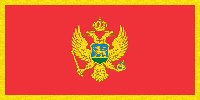
Montenegro, a part of the former Yugoslavia which has had a rather odd sovereignty association with Serbia appears to have voted to secede and become an independent nation. From the Guardian:
In a referendum that attracted a turnout of almost 90%, much higher than at any election since democracy arrived in 1990, voters decided by a majority of 56% to 44% to opt for independence rather than a creaking dysfunctional union with Serbia, according to a projection by an independent monitoring organisation last night.Lovely.
The Centre for Monitoring estimated the vote for independence at 56.3%. The separatist camp of the country's prime minister and former president, Milo Djukanovic, instantly started celebrating with fireworks and gunfire on the streets of Podgorica, the Montenegrin capital, leading to warnings from the opposition pro-Serbia unionist side. The verbal clashes suggested that more serious trouble might be brewing.
As pointed out in the Guardian, Serbia outnumbers Montenegro in population by about 9 to 1. The union itself was always untenable and the Montenegrins had been pursuing independence from the time the former Yugoslavia started to break up.
Unfortunately Montenegro, at least an independent Montenegro, is a very small country and economically challenged. The union with Serbia came three years ago when the European Union imposed it on Montenegro for both political and economic reasons.
Controversial terms set for the referendum by Brussels meant that the independence-seekers had to take 55% of the vote for the outcome to be recognised by the EU. The vote was heavily monitored by international observers, making ballot-rigging less likely. But Mr Bulatovic complained: "Such a crucial decision [independence] must not be carried out by a trick." He demanded that the government call off victory celebrations.Given that over 56% appear to have voted in favour of independence the clear majority is there with some room to spare. Predrag Bulatovic, leader of the Montenegrin Socialist People's Party and the pro-Serbia-union bloc is disputing the initial outcome and has claimed that bribery and fixing occurred during the referendum campaign.
The official results are expected today. If, as expected, the prediction is confirmed, it will establish a new small state in the Balkans and leave a shrunken Serbia nursing intense grievances from 15 years of Yugoslav disintegration. But while the margin of victory appeared solid, the projection was close enough to the threshold set by the EU to make a dispute over the outcome almost inevitable.Bulatovic has a history worth noting. He was a supporter of former Yugoslav president Slobodan Milosevic and opposed his extradition to the Hague to stand trial for war crimes.
The leader of the pro-Serbia unionist side, Predrag Bulatovic, refused to concede defeat and talked of "destabilisation" and "tricks." Tensions have been running high in the small highland republic between independence-seekers and the pro-Serbia unionist camp, although there were high hopes that the separation of Montenegro from the rump Yugoslavia could turn out to be a peaceful, if fraught, process, in contrast to the bloodshed which accompanied the independence campaigns of Slovenia, Croatia, Bosnia, and Kosovo in the wars of the 1990s.
It will be interesting to watch what happens now. Montenegro was thrust into Yugoslavia by the Great Powers after the 1914-1918 Great War. The small country has been reliant on others for protection and economic assistance since the time of the Hapsburg Empire.
Fully one-third of Montenegrins are unemployed and those with work are earning an average of 120 - 150 Euros per month. Given that, Montenegrins clearly believe they have little to gain by continuing a union with Serbia.
Serbia, on the other hand, has had its territory chipped away continuously. The Serbian government had pulled out all the stops in an attempt to sway the referendum result in favour of a continued and stronger union.
Now, it all depends on Serbia. And Serbia has erupted into violence each time they have lost another state to independence.

No comments:
Post a Comment